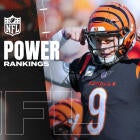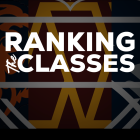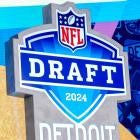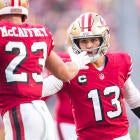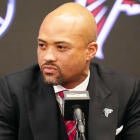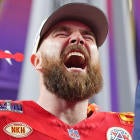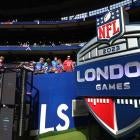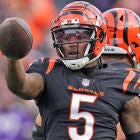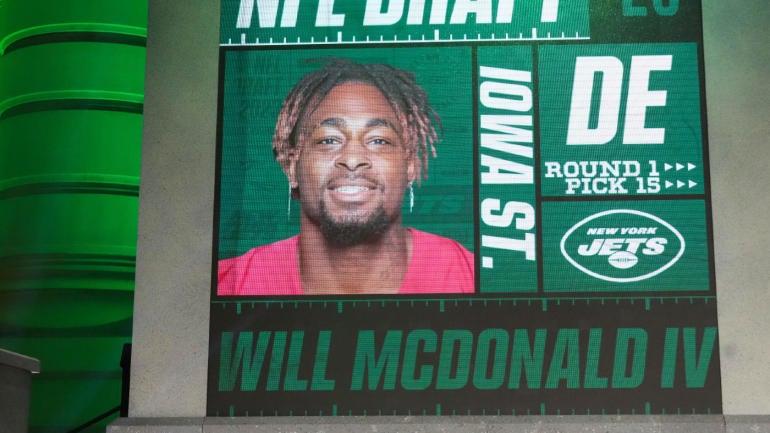
A year ago, there was one team in which I did not list a questionable choice: Seattle. The Seahawks had arguably the most productive draft class this past season. This year, I was unable to come up with a questionable choice for two teams. As a general note, I hope each of these players prove me wrong; their financial well-being is more important than my opinion.
Below, we go team-by-team taking a look at the choices that drew raised eyebrows:
AFC
Bengals
Charlies Jones, WR, Purdue (Round 4, No. 131 overall)
The Bengals had a solid draft class. It was surprising that they did not take a tight end in a year where there was depth into Day 3. Jones had his supporters in the draft community but he was ranked lower for me, personally. It is understandable that they would take a flyer on the position considering the organization's future. Joe Burrow's new contract will kick in a few years from now and keeping Ja'Marr Chase, Tee Higgins and Tyler Boyd is out of the question.
Bills
Justin Shorter, WR, Florida (Round 5, No. 150)
Shorter is an athletically gifted tall wide receiver but that never translated to production on the field. When watching eventual No. 4 overall selection Anthony Richardson, his wide receivers were often dropping passes, breaking routes off too soon or getting squeezed by defenders. Shorter did not have a drop all season, according to TruMedia, but Buffalo is going to need more consistency out of him.
Broncos
Riley Moss, CB, Iowa (Round 3, No. 83 overall)
Generally speaking, Denver had a great draft and was able to find value throughout the process. Moss is a fast, explosive player with a good track record of ball production but I did not personally value him as a top-100 prospect. The Broncos are optimistic about his future opposite Patrick Surtain II. Moss is probably going to be tested early as teams try to avoid his counterpart.
Browns
Dorian Thompson-Robinson, QB, UCLA (Round 5, No. 140 overall)
Cleveland had a good draft overall finding value without a first- or second-round selection. Thompson-Robinson is a player who was ranked lower for me personally but it is easy to follow the thought process. He has developmental traits and comes at a more affordable rate than the other backup quarterbacks on the roster; with Deshaun Watson's rising cost, that is important. Eight quarterbacks were taken between picks 127-188. The run on the position had begun and the Browns did not want to miss out on a player they had brought in for a visit.
Chargers
Tuli Tuipulotu, EDGE, USC (Round 2, No. 54 overall)
Tuipulotu was a personal favorite early in the process when he was listed at 290 pounds and showing glimpses of pass-rush potential rushing from the edge. When he measured in at 266 pounds, it raised the question of where he will play. If he is an edge rusher, then he is not as twitchy as other impact performers at the position. If he is going to be condensed inside, then he lacks the mass to hold up at the point of attack. Head coach Brandon Staley is someone who can be trusted to put Tuipulotu in a position to succeed.
Chiefs
Rashee Rice, WR, SMU (Round 2, No. 55 overall)
I was always lower on Rice than the general consensus. Looking back on my notes, I came around a lot on him this past season but felt like his routes were too robotic, like he was overthinking. Will he become a better route-runner at the next level? Kansas City is a good landing spot for him.
Colts
Jake Witt, OT, Northern Michigan (Round 7, No. 236 overall)
Indianapolis has added offensive tackles Bernhard Raimann, Blake Freeland and Jake Witt over a two-year period. Offensive line coach Tony Sparano Jr. has his work cut out for him because all are tall and athletic, but in need of refinement. In Witt's case, he is still transitioning to football and needs to add more.
Dolphins
None
Miami made just four selections so it could have gone very poorly or very well. Fortunately, it went very well in head coach Mike McDaniel's second season. They took South Carolina cornerback Cam Smith in Round 2. Smith was high on my personal board. Texas A&M running back Devon Achane is a speedster and no coach is a better fit for his skill set than McDaniel. Stanford's Elijah Higgins could grow into a tight end but will need to develop as a blocker in that scheme. Michigan's Ryan Hayes is a player who has some positional flexibility.
Jaguars
Christian Braswell, CB, Rutgers (Round 6, No. 202 overall)
There were no big issues with Jacksonville's draft until late when it started to get off the rails. There were multiple players who I had not studied because their names never came up in pre-draft conversations. For that reason, I went with Braswell even though it could have been a few other players as well.
Jets
Will McDonald IV, EDGE, Iowa State (Round 1, No. 15 overall)
New York had one of my favorite draft classes a year ago but this year's start was underwhelming. McDonald is a good pass rusher and maybe more wide-9 alignment unlocks him. There are serious concerns about his play strength and ability to contribute in run support. If he is a liability in that department, it will be difficult justifying his position on the field on early-down situations.
Patriots
Chad Ryland, K, Maryland (Round 4, No. 112 overall)
New England traded a sixth-round pick to move up eight spots and select the second kicker at No. 112 overall. He is also the second kicker to be taken by the Patriots in the past four years. Marshall's Justin Rohrwasser was drafted in the fifth round of the 2020 NFL Draft. The history of drafted kickers has been very hit or miss.
Raiders
Tre Tucker, WR, Cincinnati (Round 3, No. 100 overall)
Tucker has the added value of return ability but it was shocking that he was taken prior to his teammate, Tyler Scott. Return ability is devalued in the modern game because the league has tried to limit the big collisions that take place by moving up the kickoff point. Las Vegas really does not need wide receivers in the top 100 with Davante Adams, Hunter Renfrow and Jakobi Meyers on the roster.
Ravens
Tavius Robinson, EDGE, Ole Miss (Round 4, No. 124 overall)
Robinson is a great combination of size and speed. Baltimore has not had consistent production from that group and was searching for another body to throw into the equation. He does a good job of dislodging the ball on sack opportunities but ranked lower on my personal board. The thought process was sound though.
Steelers
None
A year ago, there was one team that I felt had zero questionable selections: Seattle. Pittsburgh had a seven-player class, so what it was able to accomplish was more impressive than Miami, for example. The Steelers added quality players at positions of need. A few of their Day 3 selections -- Wisconsin edge rusher Nick Herbig and Maryland offensive lineman Spencer Anderson -- have positional flexibility so it is easier to find spots for them on the roster.
Texans
Juice Scruggs, OG/C, Penn State (Round 2, No. 62 overall)
The Texans have had a clear objective over the past two years. They locked up offensive tackle Laremy Tunsil, then drafted edge rusher Will Anderson Jr., offensive guard Kenyon Green and Scruggs. It is obvious that they are placing an emphasis on getting more physical at the point of contact so it is easily understood why they were drawn to adding an interior lineman. However, Scruggs was lower on my personal board.
Titans
Colton Dowell, WR, Tennessee-Martin (Round 7, No. 228 overall)
CBS Sports' Emory Hunt is a big fan of Dowell but I had not personally watched him during the process so he stands out as the most questionable pick. Tennessee did a really good job of taking Kentucky quarterback Will Levis and then using the rest of the draft to add some offensive pieces around him.
NFC
49ers
Jake Moody, K, Michigan (Round 3, No. 99 overall)
San Francisco needed a kicker and there was obviously interest at the position in this range because New England took the second kicker 13 picks later. Moody was one of only two top-100 selections for the 49ers and that is a decision I philosophically oppose. They have other needs along the offensive line and in the secondary.
Bears
Darnell Wright, OT, Tennessee (Round 1, No. 10 overall)
Paris Johnson Jr. went No. 6 overall so a run on the position had already begun. In my eyes, this class never stacked up favorably to that 2020 draft class featuring Tristan Wirfs, Andrew Thomas and Jedrick Wills so the idea of two going in the first round is too rich. Wright was improved in 2022 but still felt more like a consideration around the late stages of Round 1 or early portion of Day 2.
Buccaneers
Calijah Kancey, DT, Pittsburgh (Round 1, No. 19 overall)
Kancey has commonly been compared to Aaron Donald because of his stature and alma mater. There may never be another player like Donald. Kancey's arms are historically short for a player drafted this early and there are serious concerns about his ability to hold up in run support. I hope he is the next Donald but there are reasons to be concerned.
Cardinals
Dante Stills, DT, West Virginia (Round 6, No. 213 overall)
Stills has the body type that allows Arizona to mismatch its defensive fronts depending upon the situation. He has good speed and the Cardinals desperately needed more bodies along that front. I had few issues with Arizona's draft class but Stills was ranked a bit lower on my board.
Commanders
Ricky Stromberg, C, Arkansas (Round 3, No. 97 overall)
Stromberg is a highly experienced lineman who has played the highest level of competition outside of the NFL. He has a bit of positional versatility and is a savvy, team-oriented lineman. I was lower on him because of concerns over balance but this is the type of lineman who teams will want developing in their building.
Cowboys
Eric Scott Jr., CB, Southern Mississippi (Round 6, No. 178 overall)
Scott is the type of cornerback that Dallas has been drawn to in recent years; big, tall and fast. He has had solid ball production through his career but I did not have a chance to study his film, so I know the least about him. He will not be thrust into action right way, having the opportunity to learn behind Stephon Gilmore and Trevon Diggs.
Eagles
Tyler Steen, OL, Alabama (Round 3, No. 65 overall)
The Vanderbilt transfer has played offensive tackle through his collegiate career but projects inside at the next level. Philadelphia values depth along the offensive and defensive lines so it made sense from a roster-building standpoint. Steen has inside-out versatility and that is valuable as a sixth or seventh lineman. From a talent perspective, it was a little early for my liking. Overall, I liked the Eagles' draft and their ability to find value so my complaint with this choice was lower than other teams.
Falcons
Zach Harrison, EDGE, Ohio State (Round 3, No. 75 overall)
Harrison looks like he was produced in a laboratory to rush the quarterback. He has height, weight and speed but is on the stiffer side and needs to develop a more consistent pass-rush plan. The Ohio State product has simply not produced to the level expected. It was too early for the Falcons to take this flyer.
Giants
Jordon Riley, DT, Oregon (Round 7, No. 243 overall)
Lost in the film study of Brandon Dorlus, Noah Sewell and DJ Johnson apparently was Riley. He was never the focal point of my Oregon film study so I do not have a strong opinion on him. For that reason, he is the most questionable selection. All things considered, a late seventh-round pick being the team's most questionable selection is likely a good indication of its overall draft class.
Lions
Jack Campbell, LB, Iowa (Round 1, No. 18 overall)
Detroit had an opportunity to address a few premium positions in the first round, but chose to take a running back and linebacker instead. Campbell fits the temperament that the Lions have coveted in that building but he was someone I valued on Day 2.
Packers
Sean Clifford, QB, Penn State (Round 5, No. 149 overall)
I hate to pile on Clifford even more, but his selection was not something for which was accounted; let alone in the top 150. Green Bay had a need at the position but there were more reasonable swings to be made. Clifford is a smart, accountable football player but he was, at best, the third most talented quarterback on that Penn State roster in recent years.
Panthers
Jonathan Mingo, WR, Ole Miss (Round 2, No. 39 overall)
Mingo had some adamant supporters in the draft community. He is a thicker built pass catcher with good top-end speed and burst. With his production and traits, there was always a good chance that he was going to go on Day 2 but top 50 was earlier than expected. Carolina has gone all in on supplying quarterback Bryce Young with talented pass catchers.
Rams
Kobie Turner, DT, Wake Forest (Round 3, No. 89 overall)
Turner is a really fun player to watch because of the pace in which he plays the game. He is a shorter prospect with below-average arm length. Interior rushers are usually longer and interior run defenders usually carry more mass. It was not a significant reach based on his place on the overall big board but it seemed too early.
Saints
Isaiah Foskey, EDGE, Notre Dame (Round 2, No. 40 overall)
Foskey is the prototypical height, weight and speed prospect. He has had consistent production over the past two years but shows a little stiffness in his ankles and needs to do a better job of stringing together pass-rush moves. I understand taking a chance on him to become the prospect his athletic skill set suggests he could be but it was too early based on the film.
Seahawks
Zach Charbonnet, RB, UCLA (Round 2, No. 52 overall)
The general consensus was higher on Charbonnet. There is a lot to like about his running style and his inclination to follow blocks. However, he runs too high and his motion seems a bit of robotic. There was a significant gap between the first two running backs and the next best available. Charbonnet was a bit lower on my board.
Vikings
Mekhi Blackmon, CB, USC (Round 3, No. 102 overall)
Blackmon is not going to back down from a challenge and he has great size, speed. However, proficient route-runners will be able to get him twisted at the stem and he is too handsy downfield. He is a good fit for defensive coordinator Brian Flores' scheme running more bump-and-run coverage. It was still too early in my opinion.














